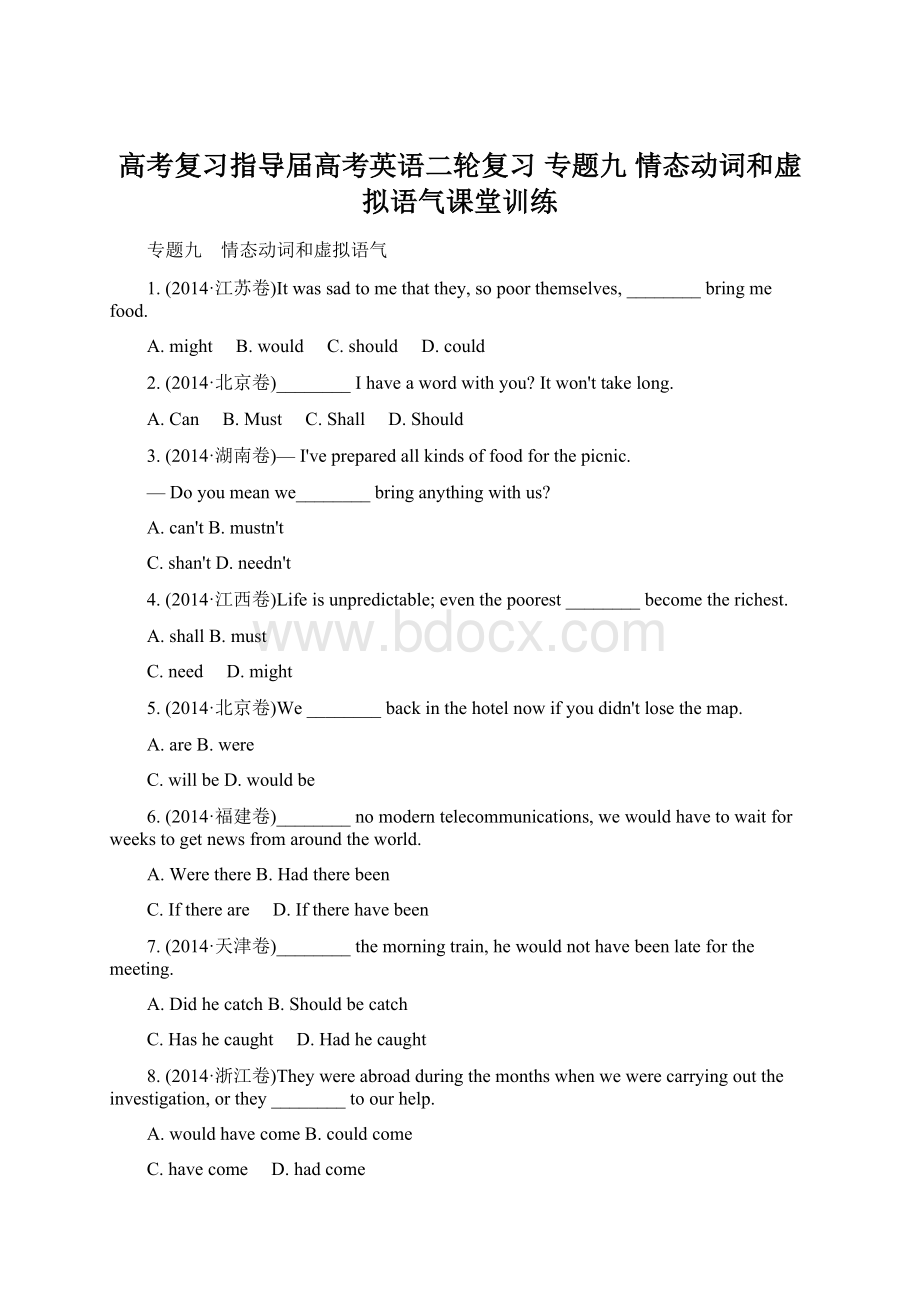 高考复习指导届高考英语二轮复习 专题九 情态动词和虚拟语气课堂训练Word文件下载.docx
高考复习指导届高考英语二轮复习 专题九 情态动词和虚拟语气课堂训练Word文件下载.docx
- 文档编号:19005977
- 上传时间:2023-01-03
- 格式:DOCX
- 页数:16
- 大小:38.60KB
高考复习指导届高考英语二轮复习 专题九 情态动词和虚拟语气课堂训练Word文件下载.docx
《高考复习指导届高考英语二轮复习 专题九 情态动词和虚拟语气课堂训练Word文件下载.docx》由会员分享,可在线阅读,更多相关《高考复习指导届高考英语二轮复习 专题九 情态动词和虚拟语气课堂训练Word文件下载.docx(16页珍藏版)》请在冰豆网上搜索。

浙江卷)Theywereabroadduringthemonthswhenwewerecarryingouttheinvestigation,orthey________toourhelp.
A.wouldhavecomeB.couldcome
C.havecome D.hadcome
9.(2014·
大纲卷)Althoughyou________findbargainsinLondon,it'
snotgenerallyacheapplacetoshop.
A.shouldB.need
C.must D.can
10.(2014·
湖南卷)IfMr.Dewey________present,hewouldhaveofferedanypossibleassistancetothepeoplethere.
A.wereB.hadbeen
C.shouldbeD.was
1.【答案】C
【解析】句意:
让我难过的是,他们自己那么穷,竟然还要给我带吃的。
should此处意为“竟然”,表惊讶。
2.【答案】A
我可以和你谈谈吗?
不会花很长时间的。
表示询问对方是否允许,can与shall均可用于第一人称,但can侧重满足自身需求。
根据句意可知,本题使用CanI...?
更合适。
3.【答案】D
——我已经为野餐准备了各种食物。
——你的意思是我们不必带任何东西了?
本题考查的是情态动词否定意义辨析。
can'
t(不可能;
不能);
mustn'
t(禁止,千万不能);
needn'
t(不必;
不需要);
shan'
t(不应该),常用口语形式。
4.【答案】D
生活是无法预测的,甚至最贫穷的人也许会成为最富有的人。
shall(将要);
must(必须,一定);
need(需要);
might(也许)。
根据前句“Lifeisunpredictable”,说明一切都有可能,所以使用might表示存在的可能性。
5.【答案】D
如果你没有把地图丢了,我们现在就会回到宾馆里了。
本题考查的是if条件状语从句的虚拟语气。
表示与现在事实相反时,条件句中使用一般过去时或were,主句使用woulddo形式。
根据从句的did可知本句是与现在事实相反,故D项正确。
6.【答案】A
如果没有现代的电信业,要想得到世界各地的消息,我们就不得不等几个星期。
本题题是一个if条件句的虚拟语气,表示与现在事实相反,if从句中使用过去时或were,主句使用woulddo形式;
另外,在if从句中如含有were,had或should时,可在if被省略的同时,were,had或should放在从句句首构成部分倒装。
7.【答案】D
如果他赶上了早班火车,他就不会开会迟到了。
本题考查的是if引导的条件状语从句的虚拟语气。
表示与过去事实相反,条件句中使用过去完成时,主句使用“情态动词+havedone”;
当条件句中的if省略的时候,要把had提前形成部分倒装,故D项正确。
8.【答案】A
在我们进行这项调查的这几个月里,他们在国外,要不然,他们就会来帮助我们的。
本句考查的是一个含蓄的虚拟条件句,句中的or相当于iftheyhadnotgoneabroad,因为前面句中使用的是were,说明这个虚拟语气是与过去事实相反,所以主句中使用的是“情态动词+havedone”的形式,故A项正确。
9.【答案】D
尽管你有时可能会在伦敦找到便宜货,但总的说来那不是一个购物便宜的地方。
should(应该;
竟然);
must(必须,一定;
非得,偏偏);
can(能够,可能,有时会)。
根据句意可知用can,表示“有时可能,有时会”。
10.【答案】B
如果Mr.Dewey在场,他就会向那里的人提供任何可能的帮助。
本题考查的是条件状语从句虚拟语气中的与过去事实相反的情况。
表示与过去事实相反的虚拟语气,条件状语从句要使用过去完成时,主句要使用“情态动词+havedone”。
根据本句后面主句中的“wouldhaveoffered”说明是与过去事实相反,故从句中使用过去完成时。
高考中,试题对情态动词和虚拟语气的考核常常利用语境和句子之间意义上的细微差别来考查学生对该语法项目的理解与掌握。
因此,在平时学习时准确理解和掌握情态动词的基本用法十分重要。
情态动词和虚拟语气在高考中的热点依次为:
对过去的虚拟语气,尤其是“情态动词+havedone”的考查频率较高;
情态动词表推测和可能性;
情态动词表示请求、允许和允诺;
以及情态动词的否定。
要点储备一:
情态动词的基本用法
情态动词
用法
否定式
例句
can
能力(体力、智力、技能)
允许或许可(口语中常用)
可能性(表猜测,用于否定句或疑问句中)
肯定句中表理论上的可能性,意为“有时会”
Howcanitbethat从句?
怎么会……?
tbutdosth.=can'
thelpbutdosth.=havetodosth.不得不做某事
t/cannever...enough再……也不为过
thelpdoingsth./beingdone忍不住做
cannot/cannot/can'
tdo
Ablindmancan'
tjudgecolors.
—Couldyougivemeahandwiththebag?
—Sure.
Howcanitbethatheislateforsuchanimportantmeeting?
Itcanbewarmhereinwinter.
Ican'
tbutcomplainabouttheservice.
Youcan'
tbecarefulenough.
Wecouldn'
thelplaughingatthejokes.
could
couldn'
tdo不可能;
不能;
不可以
may
可以(问句中表示请求)
可能,或许(表推测)
祝愿(用于倒装句中)
may/mightaswelldo不妨做
maywell(not)do很可能(不)做
maynotdo
—May/MightIuseyourcomputer?
—Yes,youmay/can.(No,youmustn'
t/can'
t./I'
mafraidnot.)
Wemayaswellstayindoorstoday.
Hemaywellrefusetotalktoyou.
might
mightnotdo可能不会做
must
必须,应该(表主观要求)
肯定,想必(肯定句中表推测)
与if,how,why连用,表“非得要”
mustnot/mustn'
tdo禁止,不允许做
—MustIhandinthepaper?
—Yes,youmust.(No,youneedn'
t/don'
thaveto./You'
dbetternot.)
Ifyoumustsmoke,pleasegoout.
haveto
只好,不得不(客观的必须,有时态人称变化)
don'
thavetodo没必要做
Wedon'
thavetogohomenow—it'
sstillearly.
oughtto
应当(表示义务责任,口语中多用should)理该、按道理应该(表猜测)
oughtnotto/oughtn'
ttodo不应该做
—Oughtwetoobservetherule?
—Yes,weought.(No,weoughtn'
t.)
shall
将要,会(表时态意义,用于第一人称)
用于一三人称表示征求对方意见(用于疑问句)
用于二三人称表示许诺、命令、警告、威胁、决心、条约规定等(用于陈述句)
shallnot/shan'
tdo不会/不允许/不可以做
Shalltheapplicantwaitoutside?
Youshallleavetheroomatonceandsheshalltoo.
YoushallhavethebookafterIreadit.
should
应当,应该(表义务责任);
理该会
本该(含有责备意味);
万一;
竟然
Why/Howshould...?
表说话人对某事不理解,感到意外或惊异
shouldnot/shouldn'
tdo不应该做
Youshouldcallhimandapologize.Suchagentlemanshouldbesorudetothelady.
Whyshouldhebesolatetoday?
will
意愿,决心;
习惯;
客观趋势,临时起意请求,建议,用在问句中would比较委婉sth.won'
t/wouldn'
tdo怎么也不……
willnot/won'
—Will/Woulddomeafavor?
—Yes,Iwill.(No,Iwon'
would
wouldnot/wouldn'
tdo不愿做;
怎么也不做
Shewilltakeawalkaftersupper.
Thedoorwon'
topen.
dare
敢(常用于否定句和疑问句中)
darednotdosth.=didn'
tdare(to)dosth.
darenot/daren'
tdo不敢做
Darehegooutaloneatnight?
—Yes,hedare.(No,hedaren'
need
需要
必须(常用于否定句和疑问句中)
neednot/needn'
tdo没必要做
NeedItellhimthenews?
—Yes,youmust./I'
mafraidyouhaveto.(No,youneedn'
thaveto.)
usedto
过去常常(现在已不再)
Thereusedtobe+n.
usednot/usedn'
t/didn'
tusetodo过去不常做
Usedhetosmoke?
Yes,heused. (No,heuse(d)n'
=—Didheusetosmoke?
—Yes,hedid. (No,hedidn'
要点储备二:
情态动词must,may,might,could,can表示推测
1
must+be是推测现在存在的一般状态
must+bedoing推测可能正在进行的事情
must+havedone是推测可能已经发生过的事情。
may,might,can用法相同
must意为“肯定,一定”,语气强,只用于肯定句中。
注意其反义疑问:
HemustbeamanfromAmerica,isn'
the?
Hemustbetalkingwithhisfriend,isn'
Hemusthavealreadyarrivedthere,hasn'
t/didn'
Youmothermusthavebeentoldaboutthetruthjustnow,wasn'
tshe?
2
may和might意为“也许”,后者语气弱,更没有把握,可用于肯定句和否定句
Hemaynotbeathome.
Theymighthavefinishedtheirtask.
3
can和could意为“可能”,could表示可疑的可能性,不及can语气强,用于肯定句、否定句、疑问句中
Theweatherinthatcitycouldbecoldnow.Wecouldhavewalkedthere;
itwassonear.
—Canhebeintheofficenow?
—No,hecan'
tbethere,forIsawhiminthelibraryjustnow.
要点储备三:
情态动词+havedone
表推测时(陈述):
may/mighthavedonesth.(语气不肯定)过去可能做了某事
t/couldn'
thavedonesth.(语气肯定)过去不可能做了某事
musthavedonesth.(语气肯定)过去一定做了某事
shouldhavedonesth.应该已做完某事;
竟然做了某事(表惊讶)
oughttohavedonesth.应该已做完某事
Ididn'
tseeMaryatthemeetingyesterday.
—Shemighthavebeenill,Iguess.
Thestreetsarealldry.Itcouldn'
thaverainedduringthenight.
Thestreetsareallwet;
itmusthaverainedduringthenight.
Ihardlyimaginesuchagentlemanshouldhavebeensorudetotheoldlady.
TheyshouldhavearrivedinBeijingbythistime.
表责备时(虚拟):
mighthavedonesth.过去本可能做而未做
couldhavedonesth.过去本能做而未做
shouldhavedonesth.过去本该做而未做
oughttohavedonesth.过去本应该做而未做
区别:
thavedonesth.过去本不必做却做了
didn'
tneedtodosth.=Itwasn'
tnecessarytodosth.
Hemighthavegivenyoumorehelp,evenifhewasverybusy.
—Didyoulistentothespeech?
—No,wecouldhaveattendedit.Butwehadalotoftrafficonourway.
Yourbrother'
sfailedinEnglishagain.Yououghtto/shouldhavegivenhimmorehelp.
—Mr.Smithdidn'
tcomelastnight,didhe?
—No.Weneedn'
thavewaitedforhim.Awholenightwaswasted.
—Sorry,sir.Ididn'
tattendyesterday'
smeeting.
—Youdidn'
tneedtocome.Actually,themeetingwascancelled.
表意愿时(虚拟):
wouldhavedonesth.想做而未做,本可以做而未做某事
wouldliketohavedonesth.想做而未做某事
wouldratherhavedonesth.宁愿做某事而未做某事
Iwouldliketohavegonetoyourhelp,butIwastoobusy.
Thefilmwasabore.Iwouldratherhavestayedathome.
表未曾实现的希望,打算、意图、诺言等:
hadhoped/planned/...+todo
=hoped/planned/...+tohavedone
=should/wouldliketohavedone
=would(rather)havedone
=was/weretohavedone
wasgoingto...本打算……
Ifyouhadcomefiveminutesearlier,youwouldhaveseenthefamousstar.
Iwastohavecomeyesterday,butmymotherfellill.
=Ihadwantedtocomeyesterday,butmymotherfellill.
=Iwantedtohavecomeyesterday,butmymotherfellill.
=Iwouldliketohavecomeyesterday,butmymotherfellill.
=Iwouldhavecomeyesterday,butmymotherfellill.
要点储备四:
虚拟语气
类别
if引导的条件从句
与现在事实相反
从句谓语:
过去式(be用were)
主句谓语:
should/would/could/might+动词原形
Ifhewerehere,hewouldhelpus.
与过去事实相反
had+过去分词
should/would/could/might+have+过去分词
IfIhadbeenfree,Iwouldhavevisitedyou.
与将来事实相反
过去式/should+动词原形/were+不定式
Ifitshouldraintomorrow,wewouldnotgocamping.
if条件句的倒装省略
如从句中含有had,were,should时,可把该词移至从句句首,同时省略if
IfIwereyou=WereIyou,Iwouldtakethejob.
错综虚拟
如主从句中使用不同的时间状语,主从句的虚拟则要依据各自时间状语
IfIhadstudiedmedicineincollege,Icouldhelpyounow.
(should)
+dosth.类
宾语从句
advise,suggest,recommend,ask,demand,require,request,order,command,decide,insist,urge后接的宾语从句中谓语动词为should+动词原形,should可省略
Hesuggestedthatwenotchangeourmind.
Hispalefacesuggestedthathewasill.
Heinsistedhehaddonenothingwrongandthathe(should)besetfreeatonce.
主语从句
Itisnecessary/important/strange/natural/amazing+that从句
Itissuggested/demanded/ordered/requested/arranged/decided+that从句
Itisapity/ashame/nowonder+that从句(that从句中谓语为“should+动词原形”,should可省略)
Itisstrangethatsuchapersonshouldbeourfriends.
It'
sapitythatwemissedsuchagoldenchance.
sdemandedthathe(should)goatonce.
表语从句
主语是idea,suggestion,order,request,decision,urge等,其后的表语从句中谓语为“should+动词原形”,should可省略
- 配套讲稿:
如PPT文件的首页显示word图标,表示该PPT已包含配套word讲稿。双击word图标可打开word文档。
- 特殊限制:
部分文档作品中含有的国旗、国徽等图片,仅作为作品整体效果示例展示,禁止商用。设计者仅对作品中独创性部分享有著作权。
- 关 键 词:
- 高考复习指导届高考英语二轮复习 专题九 情态动词和虚拟语气课堂训练 高考 复习 指导 英语 二轮 专题 情态 动词 虚拟 语气 课堂 训练
 冰豆网所有资源均是用户自行上传分享,仅供网友学习交流,未经上传用户书面授权,请勿作他用。
冰豆网所有资源均是用户自行上传分享,仅供网友学习交流,未经上传用户书面授权,请勿作他用。


 铝散热器项目年度预算报告.docx
铝散热器项目年度预算报告.docx
